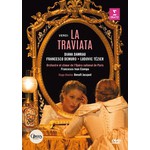
Verdi: La Traviata (Complete opera recorded in 2014) BLU-RAY
 $30.00
In Stock
add to cart
$30.00
In Stock
add to cart
GIUSEPPE VERDI
Verdi: La Traviata (Complete opera recorded in 2014) BLU-RAY
Paris Opera / Diana Damrau, Francesco Demuro, Ludovic Tézier / Francesco Ivan Ciampa (cond)
[ Erato / Warner Classics Blu-ray / Blu-ray Disc ]
Release Date: Friday 4 September 2015
Diana Damrau's primacy as an interpreter of Violetta Valéry in La traviata can be inferred from the names of theatres where she has performed Verdi's most popular opera: the Metropolitan, New York; La Scala, Milan; London's Royal Opera House; the Bavarian State Opera in Munich and the Zurich Opera. Paris's Opéra Bastille joined that list of leading houses in June 2014, when the German soprano appeared in a new production by the film director Benoît Jacquot. Conducted by Francesco Ivan Ciampa, it is presented on this DVD release from Warner Classics, which joins a DVD of Verdi's Rigoletto, with Damrau as Gilda, recorded in Dresden and released in 2010, and the recent CD release of the soprano's spine-tingling interpretation of Donizetti's Lucia di Lammermoor, recorded live in Munich.
When she first sang Violetta - in New York in 2013 - Damrau told the Metropolitan Opera's Playbill that: "I waited a long time to tackle this role because it's very special for me. I fell in love with opera watching the Franco Zeffirelli movie of La traviata with Teresa Stratas and Domingo as Alfredo. I was 12 and I sat glued to the TV screen and I cried, and afterwards I thought, 'This is the most beautiful thing humankind can create.' But I wanted to wait, because to sing Violetta and express her feelings you really have to understand life.
... Violetta's done it all, and she knows she's going to die and that when she's gone people won't care. But she has a very honest heart. She's the only person in the opera who loves without limits. And to give up Alfredo for the sake of his family - greater love is not possible. She's selfless."
Jacquot's production, praised for its beauty, elegance and intelligence by the French newspaper Les Echos, is set firmly in the 19th century. It takes inspiration from the paintings of Manet and features sumptuous 19th century costumes and striking decor, such as monumental canopy bed in Act I and a huge tree and a giant staircase for Act II.
When it came to the performances, Les Echos said that Diana Damrau "lived up to expectations" with "such expressive truth and such a palette of nuances in every phrase" and with her understanding of Violetta's physical and psychological fragility. The Financial Times stated that " ... [Damrau's] voice is simply glorious, whether in cradled pianissimi or heroic outbursts," and went on to praise her male partners: "Her good-looking Alfredo, Francesco Demuro, has youthful passion and ringing tenor tone ... As Germont père, Ludovic Tézier shows off his superb baritone." The British magazine Opera, meanwhile, felt that: "Ludovic Tézier ... could hardly be bettered, blending velvet and steel and assuring a superb legato."
"Violetta is played by Diana Damrau, a soprano of matchless intelligence. Technically, she is perfectly at ease in a role that has sometimes been described as demanding too much of one singer. So there's both grace and sparkle in the coloratura of act one, and enough metal in the voice to manage the dramatic extremes of act three. In between, the effect of moral pressure on her relationship with Francesco Demuro's Alfredo, is expressed in breathtaking, superbly controlled lyricism." (Guardian)
"The new production by the filmmaker Benoît Jacquot places the opera squarely in mid-19th-century France, just as Verdi specified. It relies on few sets to do so, but they make up for sparseness with their monumentality. Sylvain Chauvelot's décor will please traditionalists yet is presented with modernistic flair. André Diot's lighting, for instance, leaves the surrounding stage in total darkness, so all you see are the props and the characters of the familiar story of ill-fated love between Alfredo, a young man from the country, and the glamorous Violetta. Musically, Ms. Damrau is in outstanding form and demonstrates a range of vocal colors to fit every facet of the role.
The coloratura challenges of the brilliant cabaletta "Sempre libera" hold no terrors for her (though I could do without the interpolated high E flat). Even more memorable is the way she shapes expressive or passionate utterances by striving to make every note count. After her scene with Germont, the pianissimos she brings to the words "Dammi tu forza, o cielo!" (Heaven, give me strength) turn them into a tiny prayer charged with immense feeling." (New York Times)